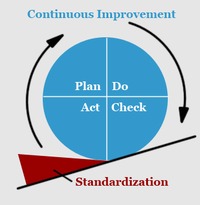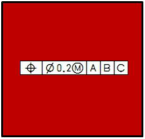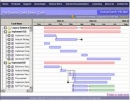|
This course is available in half-day and one-day formats and is designed to teach participants the philosophy and requirements of the ISO/TS-16949:2009 standard. Our half-day session is intended for senior managers and leaders, while the full-day session is intended for personnel who will be involved in implementing the requirements of the Standard.
The presentation is designed to apply equally to all automotive parts manufacturers at all Tiers, regardless of whether their customers are North American, European, or Japanese. The Process Approach of the Standard is emphasized. Each session is tailored to discuss the customer-specific requirements which apply to your organization. |
|
This one day course is designed to teach participants the fundamentals of the ISO 14001:2015 Environmental Management System (EMS). Upon completion, participants will understand how to identify the environmental aspects of their company and how to set measurable goals to reduce their impacts on the environment.
This course can be combined with our two day internal auditor training to qualify your EMS internal audit team. The session includes a workshop where small groups begin to identify the key environmental aspects and impacts of their organization. This hands-on approach will reinforce the lecture, and ensure full understanding by all participants. |
|
This two day course is designed to teach participants the basics of the ISO/TS 16949 Quality Management System, and provide them with the tools and techniques to perform a competent "Automotive Process Approach" assessment of the effectiveness of their system. This course is also available as an Internal Audit course for the German VDA 6.3.
The foundation of this training is Devos Associates' unique "Risk is the Compass" ™ approach to auditing. This model has been published and presented at several conferences and is widely recognized as the leading model for incorporating business risk when conducting a Process Approach audit. Organizations are strongly encouraged to combine this training with a real internal audit under the guidance of the course trainer to reinforce the training and provide valuable feedback regarding their performance and effectiveness. |
|
This is an additional one-day module that can be appended to the two-day ISO/TS 16949:2009 internal auditor training. The Ford Motor Company requires that internal auditors have training in the Core Tools of the automotive industry.
Regardless of specific customer requirements, it is highly encouraged that all internal auditors have a fundamental understanding of Core Tools as they are so integral to the processes that they will be examining. Core Tools training includes an auditor’s-eye view of SPC, MSA, FMEA APQP and PPAP. |
|
This course is offered in two-day and three-day formats and introduces the concepts of Lean Methods and stresses the philosophy behind a Lean culture. The largest obstacle to overcome is one of attitude and engrained company culture. The differences between mass production and Lean Manufacturing attitudes are explored and leadership issues are discussed.
In the three day session, a half-day workshop models the organization’s own process, and creates both a current-state value stream map and a future-state value stream map. This introduction is tailored to manufacturing or the service sector, as appropriate. This introduction to Lean Manufacturing is ideal for engineers and managers who are ready to become Lean! |
|
This five-day project is intended to teach the fundamental Lean principles and apply each one to a real project within the organization. This is a more in-depth and practical training than the introductory course and results in a re-engineered process at the end of the week.
Each topic is treated as a lecture and then immediately applied to the project in the plant. Topics include 5-S, Seven Wastes, Cellular Manufacturing and one-piece flow, Kanban, SMED, OEE and Value Stream Mapping. Participants in the event will be those workers and support functions directly responsible for the process being re-engineered. |
|
This one-day course introduces participants to an approach to identifying and implementing continuous improvement projects. No matter what your product or service, Continuous Improvement is the cornerstone of an effective Quality System.
The most challenging aspect of sustained improvement is creating an environment for improvement. Lectures include tips on change management and those inhibitors that can become obstacles to adopting continuous improvement as a philosophy. Emphasis is placed creating a customized approach for identifying and managing continuous improvement initiatives for each organization. Disciplines are presented as a fact-based, standardized approach to problem solving. |
|
Design of Experiments is a three-day course that begins with first principles and operational definitions. Emphasis is placed on distinguishing between significant factors and noise. The quality statistics review considers the role of process stability and capability in interpreting the results of experimentation. Measurement Systems Analysis is introduced to assess the appropriateness of a measurement process prior to that process being used in experimentation.
Weibull analysis is used to understand the behavior of distributions, and to assess whether the resulting data set is the result of significant causal factors. Knowledge gained will guide the iteration of the problem statement, and derive hypotheses to test. Experimental strategies and designs are instructed from two definitive texts on the subject. |
|
This two day course is a perfect introduction to Geometric Dimensioning and Tolerancing (GD&T). This session is designed for practitioners who are required to read GD&T on engineering drawings, such as QA Engineers, Inspectors, and CMM Operators.
GD&T is the language of engineering and manufacturing, and competency in understanding reference frames and properly interpreting tolerances is an essential skill for everyone in a technical role in a manufacturing organization. Learning objectives are to learn the rules, definitions and symbols of ANSI Y14.5-2009, along with and understanding of datum structure, feature control frames, and shape size and location of tolerance zones. |
|
This course is customized for the automotive industry and is offered in one or two day formats. It is designed to teach participants to perform effective problem-solving, based on proven approaches.
Emphasis is placed on seeking root-cause as a fact-based, standardized approach to problem solving. In addition, the Seven Tools of Quality which support each of the steps are introduced. Several problem solving approaches are addressed, including 8-Disciplines, DOT*STAR, Five-Why, and Is/Is not. This training can be coupled with the investigation and solving of a real-world problem within the organization. |
|
This two day course is designed to teach participants the basics of the AIAG Failure Modes and Effects Analysis (FMEA) methodology, fourth edition.
During process design, the FMEA is likely the most powerful tool that Process Engineers and Managers have at their disposal. FMEA training can assist an organization to anticipate failure and prevent problems before they occur. Organizations can choose between separate Design FMEA and Process FMEA courses, according to their needs. |
|
This three day course is designed to teach participants the basics of the AIAG Advanced Product Quality Planning (APQP) process, and its output, the PPAP. Detailed discussion of FMEA and Control Plans will ensure that participants are able to contribute effectively in a cross-functional APQP team.
Emphasis is placed on the organization’s own APQP procedure and beginning a launch whenever possible. The kick-off meeting can be conducted, and the Process Flow Diagram, PFMEA and Control Plan can be substantially completed. Another key learning objective is to ensure that participants are taught to think from a “risk” perspective, to ensure that all discussion and decision making is solidly focused on risk reduction. |
|
This two-day course provides participants with the tools to understand process variation, and how to use data to let a process speak to them. Although mathematics is used, its role is de-emphasized. The focus is on what Control Charts really mean, and how to use them to understand process behaviour and take appropriate action.
Workshops include building normal distributions, and creating an Xbar and R chart for variable data and a c-chart for attribute data. The course facilitator will work with each individual to ensure that an appropriate practical skill is attained. |
|
This one or two day course will provide the confidence that practitioners need to execute, referee, and interpret the results of the four types of measurement studies referenced in the AIAG MSA Fourth Edition. After this course, participants will be capable of participating and leading Gauge Repeatability and Reproduceability Studies (GR&R) for both variable gauges and attribute gauges.
Emphasis is placed on understanding the concept of gauge error and the practical use for choosing and optimizing a measurement method. Classroom lecture is combined with simple examples to create a learning environment that is both effective and enjoyable. The two day course has several more work-shops using real parts from the organization, and culminates in the performance of a “real” Gauge R&R Study by all of the participants |














